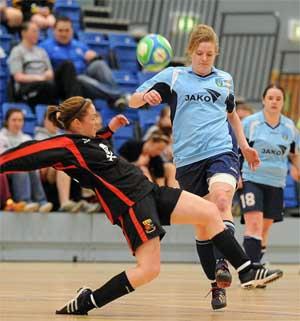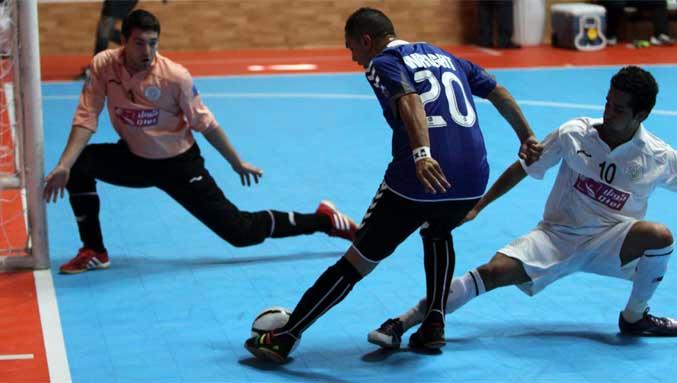 Futsal is grabbing the soccer world by storm.
Futsal is grabbing the soccer world by storm.Is “futsal” the secret to soccer success?

May 10, 2010
When you hear the word futsal, what do you think?
Brazilian soccer magic? South American flair? Quick, small-sided soccer that works wonders for a player’s passing skills and first touch?
If you answered "yes" to any of the above, you’re not alone.
For those who don’t know already, futsal is the next big thing in the soccer world, and it’s not just a fad.
In fact, it could be a key to the U.S. taking the next step as a soccer nation.
A dynamic sport invented in Uruguay in the 1930s, futsal took a while to catch on outside South America, but its popularity has spread like wildfire over the past few decades. And now it has finally started to take root in the United States.
 Futsal is grabbing the soccer world by storm.Futsal (derived from the Spanish fútbol de salon, or “hall football”) is like regular indoor soccer with five players on each side, but it is played on a hard court delimited by lines rather than walls or boards and uses a small ball with less bounce than a regular one.
Futsal is grabbing the soccer world by storm.Futsal (derived from the Spanish fútbol de salon, or “hall football”) is like regular indoor soccer with five players on each side, but it is played on a hard court delimited by lines rather than walls or boards and uses a small ball with less bounce than a regular one.
The rules of futsal emphasize creativity, improvisation, technical skill and the ability to pass in tight spaces – in short, many of the things missing from the American game today.
Those who play futsal alongside soccer growing up develop the fundamental skills of soccer almost automatically, so by the time they step on a full-size field, they are well-equipped to take the next step as players.
It’s no wonder, then, that many non-American superstars like Ronaldinho and David Beckham credit futsal for developing their abilities.
“Futsal was important in helping to develop my ball control, quick thinking, passing … also my dribbling, balance, concentration … Futsal was very, very important, no doubt,” the legendary Pelé has been quoted as saying.
So why, exactly, is futsal so effective?
The small, hard court allows each player to get many more touches on the ball than they would on a full-size field, where the ball is slowed down by distance and grass.
The tight space creates constant pressure on the team holding possession, so the players have less room to dribble or pass. All decisions must be made quickly, on the move.
The low-bounce ball does not kick well over long distances, so players must develop pinpoint passing at close range. The small goals also require greater accuracy on shots.
And the fast pace of the game forces players to run constantly, which improves their conditioning.
In all, futsal is great for young players to develop their fundamental skills and conditioning in a fun way, without having to endure those tedious and repetitive drills at soccer practice.
The sooner more young American players start playing futsal, the quicker the U.S. will improve its soccer standing in the world. There are futsal arenas cropping up all over the country, so it’s time to go play and let the sport work its magic.
Because if the word futsal means anything to you other than that, you’re quickly getting left behind.
Brazilian soccer magic? South American flair? Quick, small-sided soccer that works wonders for a player’s passing skills and first touch?
If you answered "yes" to any of the above, you’re not alone.
For those who don’t know already, futsal is the next big thing in the soccer world, and it’s not just a fad.
In fact, it could be a key to the U.S. taking the next step as a soccer nation.
A dynamic sport invented in Uruguay in the 1930s, futsal took a while to catch on outside South America, but its popularity has spread like wildfire over the past few decades. And now it has finally started to take root in the United States.
 Futsal is grabbing the soccer world by storm.
Futsal is grabbing the soccer world by storm.The rules of futsal emphasize creativity, improvisation, technical skill and the ability to pass in tight spaces – in short, many of the things missing from the American game today.
Those who play futsal alongside soccer growing up develop the fundamental skills of soccer almost automatically, so by the time they step on a full-size field, they are well-equipped to take the next step as players.
It’s no wonder, then, that many non-American superstars like Ronaldinho and David Beckham credit futsal for developing their abilities.
“Futsal was important in helping to develop my ball control, quick thinking, passing … also my dribbling, balance, concentration … Futsal was very, very important, no doubt,” the legendary Pelé has been quoted as saying.
So why, exactly, is futsal so effective?
The small, hard court allows each player to get many more touches on the ball than they would on a full-size field, where the ball is slowed down by distance and grass.
The tight space creates constant pressure on the team holding possession, so the players have less room to dribble or pass. All decisions must be made quickly, on the move.
The low-bounce ball does not kick well over long distances, so players must develop pinpoint passing at close range. The small goals also require greater accuracy on shots.
And the fast pace of the game forces players to run constantly, which improves their conditioning.
In all, futsal is great for young players to develop their fundamental skills and conditioning in a fun way, without having to endure those tedious and repetitive drills at soccer practice.
The sooner more young American players start playing futsal, the quicker the U.S. will improve its soccer standing in the world. There are futsal arenas cropping up all over the country, so it’s time to go play and let the sport work its magic.
Because if the word futsal means anything to you other than that, you’re quickly getting left behind.
Headlines
- Recruiting Roundup: October 13-19
- How Do I Get Scouted by TopDrawerSoccer?
- ND Remains No. 1 in Women's DI Top 25
- IMG Academy Player Rankings: Girls 2028
-
Commitments: From Florida to Upstate NY

- TDS Men's Division l Top 25: Oct. 13
- Women's Midseason Top 100 Freshmen
- Men's D2, D3, NAIA Weekly Recap
-
Mid-Atlantic High School Roundup - Oct.

- Women's D2, D3, NAIA Weekly Recap
IMG Academy Top 200/150 Rankings



